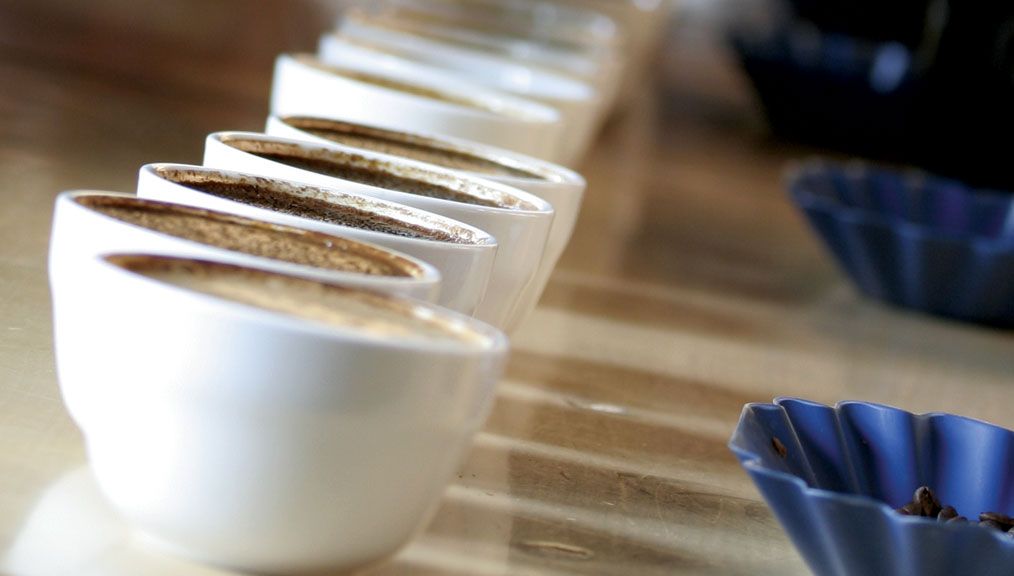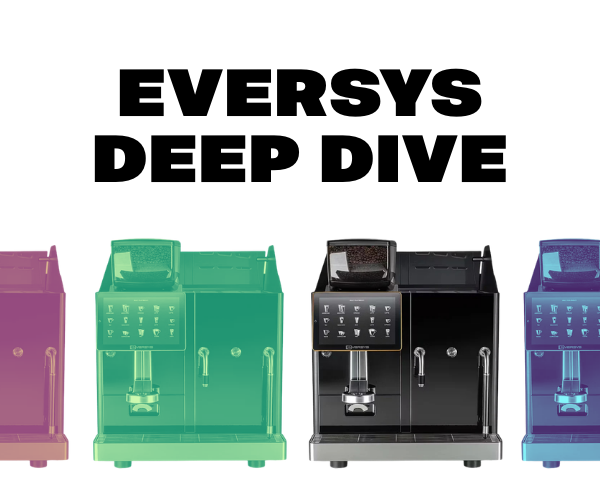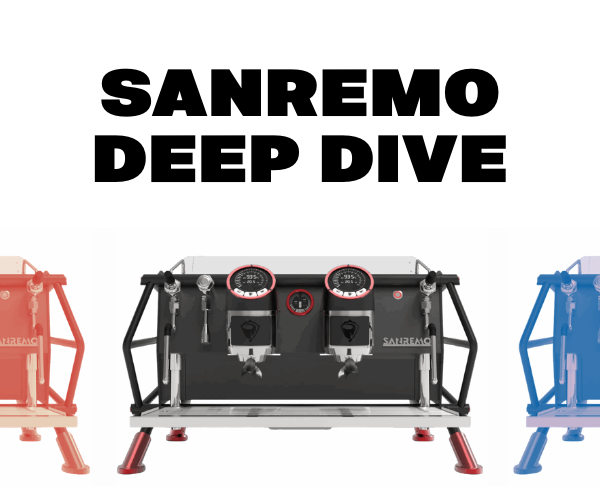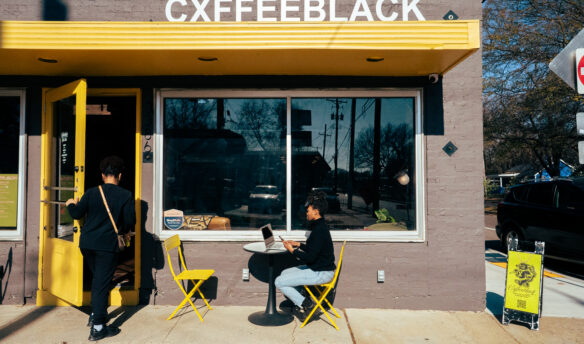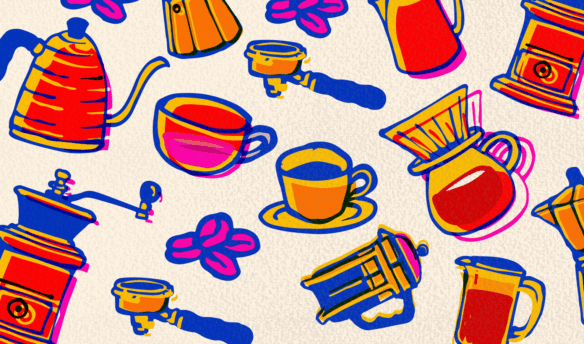Six sets of three cups of coffee are neatly arranged on a table. Each group of three includes two cups of the same coffee and an odd one out. To make matters more challenging, each coffee on the table comes from the same region and shares the same processing method. Armed only with a cupping spoon and their senses, Q grader candidates must select the odd cup in at least five of the six sets.
The process described above—picking the odd one out in a set of similar cups—is called triangulation, and triangulation tasting is one of twenty requisite exams in the Q grader licensing process. With over 4,000 licensed Q graders worldwide, this certification offered by the Coffee Quality Institute (CQI) is widely recognized as the most authoritative certification in specialty coffee. “Certified Q Graders are professionals skilled in sensory evaluation of green coffee,” the CQI website reads. “By setting global expectations, CQI helps both buyers and sellers benefit through a shared understanding of quality coffee.”
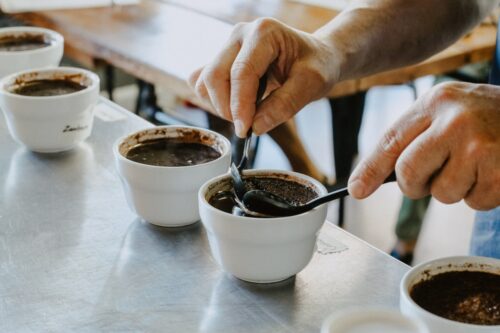
Simply put, the Q grader certification program helps coffee folks develop a standardized way to evaluate and describe coffee. Many Q graders use the word “calibrated” to clarify the certification process—or having a common baseline to share what they’re experiencing when they assess a cup of coffee.
From the first time I heard of the Q course, I knew I wanted to take it. For me, the decision was easy. But there are many factors for baristas to consider if they want to add a certification to their resume.
Moving Up
In an industry with precious few salary jobs, many ambitious, up-and-coming coffee professionals have turned to certification programs like the Q license to bolster their credentials and open new career possibilities.
“Taking the Q Course can be beneficial to almost everyone in the coffee industry,” says Jodi Wieser, a Q instructor and co-founder of Gather Coffee. From Paris to Tulsa, Wieser and her business partner Marlee Benefield offer Q courses at Specialty Coffee Association-certified labs worldwide. Wieser, who has served as a judge for the Best of El Salvador, Best of Panama, and the Good Food Awards, credits her Q license for boosting her career.

Wieser sees the Q certification as a quick reference point to display your coffee background to other professionals. “If I am conversing with a fellow coffee professional and they mention they’re a Q grader, I immediately understand what they’ve been through to receive the certificate,” she says. “I know they’re not only calibrated with the specialty coffee industry but also familiar with SCA protocols and standards. They understand quality assessment and the importance of conveying an objective analysis about the coffee.”
The Q certification process is notoriously difficult—over 75 percent of candidates fail their first attempt. But according to Wieser, the challenge shouldn’t prevent young coffee professionals from trying. “Anyone can take the Q course and should do it as early as possible in their career,” Wieser says. “This allows you to be calibrated with the rest of the industry that much sooner.”
For Wieser, coffee evaluation is not the exclusive realm of a select group of super tasters. “I believe most people can learn how to identify what they are smelling and tasting,” says Wieser. This is where the instruction portion of the Q course comes into play.
Candidates learn SCA cupping protocols between practice exams and teaching sessions to prepare for the Q grading certification. Whether they’re learning about the proper Agtron reading of a sample roast or the organic acids found in coffee, even students who don’t earn their license walk away with a wealth of coffee knowledge.
Worth The Price of Admission?
With a price tag in the thousands of dollars, taking a Q course remains a remote possibility for many baristas. Certified labs are few and far between, and travel, lodging, and missed work prove to be insurmountable obstacles for many aspiring coffee professionals. Some coffee professionals question whether the certification is even necessary.
“Most of the skill set happens on the job,” says James Tooill, director of La Colombe Torrefaction’s Workshop line.
Without any CQI or SCA certifications, Tooill won the 2015 US Cup Tasters Championship, a competition built around triangulation tasting. “Certifications can help you get that job, but I think there are other ways [to get where you want to go], be it competitions, self-funded travel, or just being very engaged at work,” says Tooill.
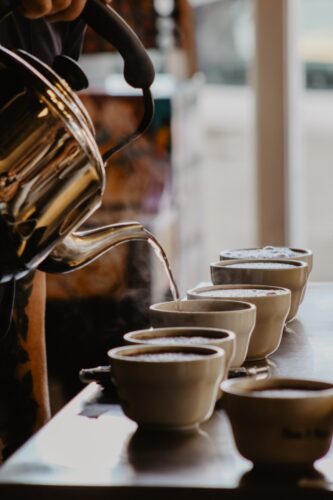
Although Tooill recognizes the merits of a Q license and other programs, he took a different path. “I decided it wasn’t the best use of my money,” says Tooill. “If you see a job posting with a required certification, by all means, get that certification if you want that job. We might see more openings that require certifications in a more mature market.”
But for Wieser, reasons to take the Q extend beyond career ambitions. “At every level of the value chain, we are assessing quality in one form or another,” she says. “Becoming a licensed Q grader gives one the ability to assess quality with confidence knowing he or she has been trained and is calibrated with the rest of the specialty coffee industry.”
Since I earned my Q license, my career has not dramatically changed. No one is flying me to coffee farms or paying me copious amounts of money for my opinion. If anything, I’ve discovered how much more I have to learn. But I feel more confident in trusting my senses when evaluating a coffee, and I incorporated much of what I learned into the training program at Quills Coffee, where I work.
Is a Q license a golden ticket to your dream job? Probably not. Will you benefit from taking the course? Absolutely.
Michael Butterworth is the cofounder of etkincoffee.com and thecoffeecompass.com. He lives in Istanbul, Turkey.
This article was originally published on September 28, 2016 and has been updated to meet Fresh Cup’s current editorial standards.

